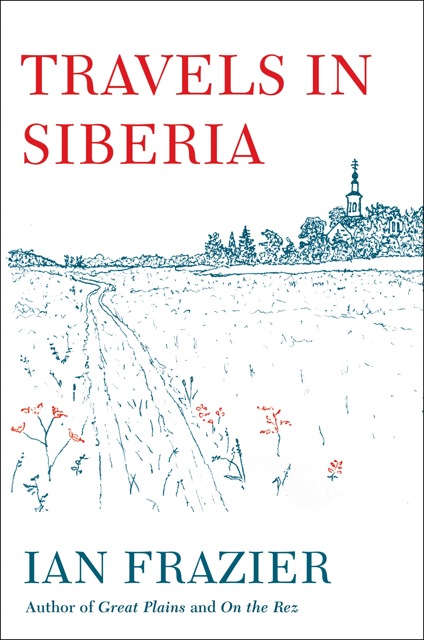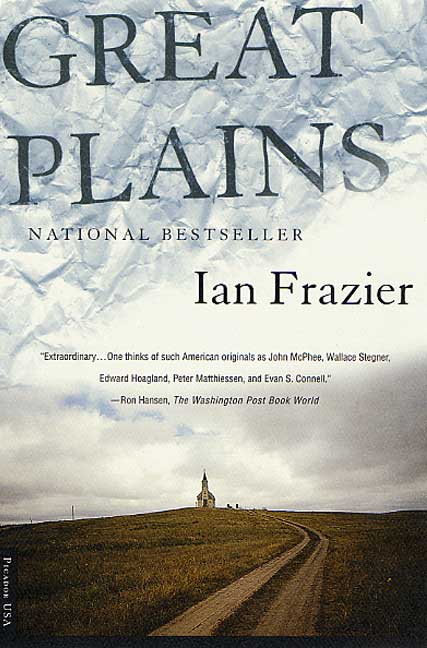Ian Frazier balances a profound sense of curiosity with an equally profound sense of humor. He's as comfortable writing about Russian literature as he is writing about getting plastic bags out of trees. He's written about the Sioux, about silver carp, about walking to Queens. Hired by the New Yorker at 23, Frazier has contributed to the magazine for three decades. Great Plains is his sprawling bestseller about the West, The Fish's Eye is a classy collection of essays on angling. His ambitious new book, Travels in Siberia, is part history, part travelogue--it centers on a compelling five-week road trip in an unreliable delivery van. Frazier has the rare skill of being able to make an inside joke in print--you feel complicit with his wry sensibility and appreciation of the absurd. He knows it's crazy to go to Siberia in the winter and goes there anyway. How many Thurber Prize winners can you say that about?

Serious Bemusement.Photograph: Sigrid Estrada.
We spoke recently at the Corner Bistro in Manhattan.
You've been interested in Siberia for more than 10 years--when do you know you're going to write about a certain topic?
With Siberia, I wanted to do something big. I was friends with Russians who said I should see Russia. I went there in '93 and it was so exciting, and I went to Siberia and had a great time. I had seen an Air Alaska schedule in a Montana airport and I saw that you could fly from Missoula to different cities in Siberia.
Does it seem logical to drive across a place as massive as Siberia?
There were lots of books about crossing Siberia by train, but because Russia was suddenly open you could go to these places that had been closed since the Bolshevik Revolution. So there was the ability to go places that were not open before.
What surprised you about studying and traveling in Siberia?
Well, I had a huge affection for Russia but I didn't know anything about it. I had Russian friends who'd just say 'No, you don't know anything.' I felt so intimidated. They said 'Just do a first impression book, because you're never going to figure it out,' and they said 'You're never going to learn the language, the language is really hard.' And they were right: I didn't learn the language.
It's funny when you describe struggling with the different sounds of the language.
I think there's an occupational disease of language teachers--they're so good at language that a Stockholm syndrome can take over: they adapt to your lousy skills and they learn how to communicate in your terrible language. It's like you've created a little private language. Then you go talk to somebody else and they go 'What?'
Parts of the book reminded me of Peter Fleming, the terrific English travel writer, who traveled through Siberia and China in the 30's. There's a certain type of person who goes to Siberia.
That's right, there are a lot of English people. But I only saw one English speaking person all the way across Siberia. Did you ever read In Patagonia? That's such a brilliant book, and why did he go there? It's such an unusual place, it wasn't like being in the south of France.
Didn't Chatwin say that he was interested in the fact that there was a Welsh village in Patagonia?
Right, that was his original inspiration to go there.

You alternate between the historical and then cut to you in your Renault van. The reader learns about the history but then you also wonder if the van is going to start.
You want a lot of different plot strains going along, because that keeps the reader going. Nonfiction where you follow your curiosity, you have a real problem with the reader saying 'Why should I go with you?' If you have a travel narrative, you have a plot, and something does get accomplished.
Do you ever have the fear when you set off on a certain topic people aren't going to bear with you?
Well, you pray they'll bear with you. If you can get through it yourself you figure anybody else can. When I was doing research for Great Plains, I came across failed works that other people had left. There was this wonderful bunch of papers in the Nebraska Historical Society, called the Ricker files, by a lawyer who was going to write a book about the Plains Indians. He interviewed every single guy that had been at the Battle in Little Bighorn, and he interviewed every living person that had ever known Crazy Horse. But there was a little paragraph at the beginning of the Ricker files, by whoever catalogued them, and it said: 'Unfortunately, Mr. Ricker became lost in his research.' He got so into it, that that was it, he never came out of it, and he never did a book.
Didn't a lawyer write John McPhee and say 'Stop writing about geology'?
That's right. Did you read the
It was great--he's a master class in how to write. It's like reading the E.B. White letters.
The letters are a really good comparison--somebody who's done it his whole life, and really knows how.
Russia appeals to your comic sensibility. Can you talk about this eccentricity and cultural attraction?
I haven't been to many countries but I know Russia's hilarious. It's intentionally funny and it's unintentionally funny. That is: it has truly funny writers. Gogol is a brilliantly funny writer. In the opening of Dead Souls, the first page is two guys sitting there looking at a carriage going by and the wheel is wobbling. One guy says 'Do you think that wheel will make it as far as Kazan?' and the other guy says 'No, I don't think it'll make it,' and the guy says 'Will it fall off at such-and-such?' and they're talking about where that wheel is going to fall off. And that's the beginning of the book, it has nothing to do with anything, although the main character is in the carriage.
So that's the intentionally funny side.
Right. People in Russia adapt to misery by a deep, deep humor. Russian humor is to adapt, or make some sense, or nonsense out of the insanity of their lives. Russia is like slapstick, only you actually die. It's extreme humor. And they know it's funny, like in the second world war, when they didn't have enough parachutes to drop guys, they just flew low and the guys jumped out. Though I don't know if that's true or not.

Some of your short pieces start with curious subjects, like acorns or shower curtains. Can you talk about the process when you have an impulse to write about something that isn't inherently funny?
If you've done humor for a while you realize there aren't that many tricks. Coyote V. Acme is just a way of getting people to laugh by doing something that's a combination of the way you tell it and the content of what you're saying. There are ideas that you don't really know why they're funny. Usually what happens is you see something in the world that makes you understand that it's universal.
Well the bags stuck in trees is a perfect example. Before I read that piece I didn't know that bothered anybody besides me. When I read that I felt oddly validated. Have you ever had an idea when an editor thought your idea was too strange?
Oh yes. Or you have an idea and you say it and your voice is very uncertain. There's a silence and you don't know what will happen. Sometimes after the silence, there will be a huge laugh. Once I had an apartment on Waverly Place that was really horrible, I just didn't take care of it. This was at the time we had just left Vietnam and there were all these articles about 'What's Vietnam like a year later?' I was sitting around an uptown apartment and somebody said 'I think it's interesting all the stuff we abandoned to the North Vietnamese.' And I said 'I'd like to abandon my apartment to the North Vietnamese.' And then I got a really big laugh. I ended up doing a whole piece about abandoning my apartment to the North Vietnamese.
Can you talk about the drawings in the book and your relationship to photography when you travel?
I carry disposable cameras and use them until they're done. I'm terrible with equipment. It surprises people if you don't have a fancy camera. When I took that trip my Russian was just not good enough to take me through social situations in the evening. I found that if I took a little folding camp stool and went someplace and drew, it explained me. It was a way of having something to do, otherwise I would just wander around.
The drawings let the reader learn about the landscape in an unexpected way, and they create a more personal connection to the author. It seems like you like to give yourself over to unexpected texts.
Well, I can read really boring books.
What do you demand from a boring book?
Well I demand something happens every so often, and nobody else knows it's there. I once read an interview with Tom Clancy, and he was asked 'How do you get all your details?' And he said 'Those things are all printed, it's just that the books are too boring for most people to read, and I'll sit there and read them and I'll get one fact about a nuclear submarine out of one book.' So it's a feeling of exploration. But there are lots of really good nonfiction books of the past that you've never heard of because nobody keeps them alive. Nonfiction is very perishable, it's like performance art: you had to see it. There are a lot of books about the west that are really good but the situation has changed so dramatically that there's no reason to read them. Even semi-famous books like The Oregon Trail tells people what was the Oregon Trail like, what Indians are like, because Frances Parkman lived with the Sioux.
It's even true of old New Yorker articles, even by great writers like A.J. Liebling.
Right. He's writing about a convoy going across the Atlantic with submarines out there, and that was a nail-biter for people back then. He was an incredibly good writer and a funny writer too.
When you say you can read boring books, you're looking for details you don't know you're going to get.
Right. A book that describes a monk traveling across Asia at the command of Genghis Khan to tell Genghis Khan the meaning of life. So he has to travel from Peking to Afghanistan, and he had disciples, people who were with him who kept journals. It tells you what the monk did, and it tells you what the difficulties of the journey were. But it's not something to read unless you wanted to find a particular thing out. I'm reading along and suddenly they're describing this river, and the disciple who's keeping the notes said 'The river was cold, it was about such-and-such long.' Then it says 'and it bubbled like sonorous jade.' And you just stop and think this fabulous sentence is worthy of Elizabeth Bishop.
Talking about obscure texts--what do you think about Google Books?
You have to see the book itself, it has to exist somewhere. But it's wonderful that they're online. Sometimes I would be caught up in a book and be negligent with my note taking. Now I can find it on Google Books, and that's great.
What do you think about the New Yorker and magazines in general?
Well, I love magazines, and I adore the New Yorker. I've been there since I was 23, and I'm almost 60. I was hired as a Talk reporter when I was just out of college. Saul Steinberg used to say the New Yorker is my patria. I resisted that, but now I just love it. Magazines are trying to be more interesting and I think they're doing a good job. I cheered for Rolling Stone this summer. I thought, Yes! you got McChrystal, and he got suckered, and I thought it was a totally clean hit, and I thought he took it well. He took it like a soldier and left. I thought they did more for magazines with that, because if that had been online it may not have had the same effect. But this was a long piece, it was something with Lady Gaga on the cover, bare-assed looking fabulous, and you open it and there it is. I thought it was one of the best magazine issues.
The New Yorker is going on the iPad.
I think it's great, you see my drawings online when stories come out. I don't normally read Ebony and I just read every word in Ebony.
What made you buy that?
Idris Elba, the star of The Wire. His biography said, 'Unless you've been living under a rock for the last eighteen months, you know who this guy is,' and I didn't know who this guy was. I love getting out of my normal reading pattern, and each article was more fascinating than the one before it. There was an article about what Aretha Franklin's doing now. It said Aretha received some communication from Condoleezza Rice, who's a big fan. So they're going to do a concert together with Condi playing the piano and Aretha saying 'She's a pretty good piano player, I'm happy to do it with her, it's a benefit.' It was the next night, and it just so happened it was the next night in Philadelphia. I would have gone to that thing in a heartbeat. I would have loved to see Condi and Aretha on the same stage. And as I looked at that magazine I thought 'They're trying to be interesting, and they're succeeding.' So I have real hope about magazines, and I feel the same way about books.